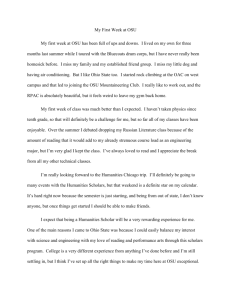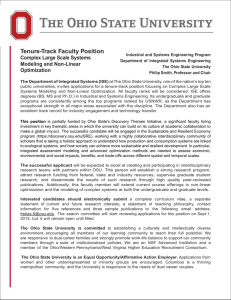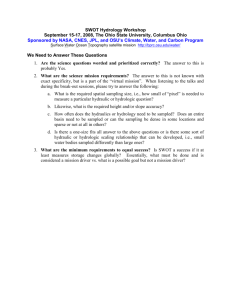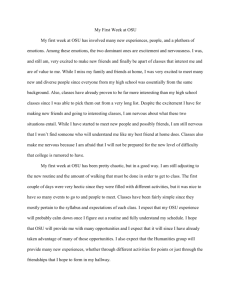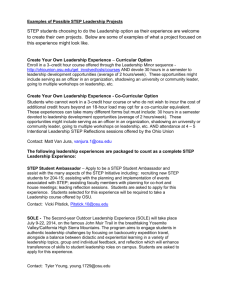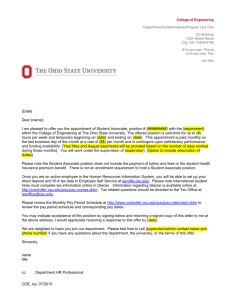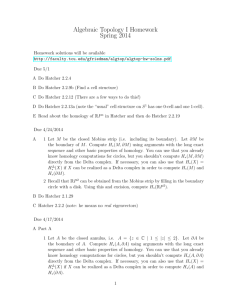ASC Announces Recipients of 2007
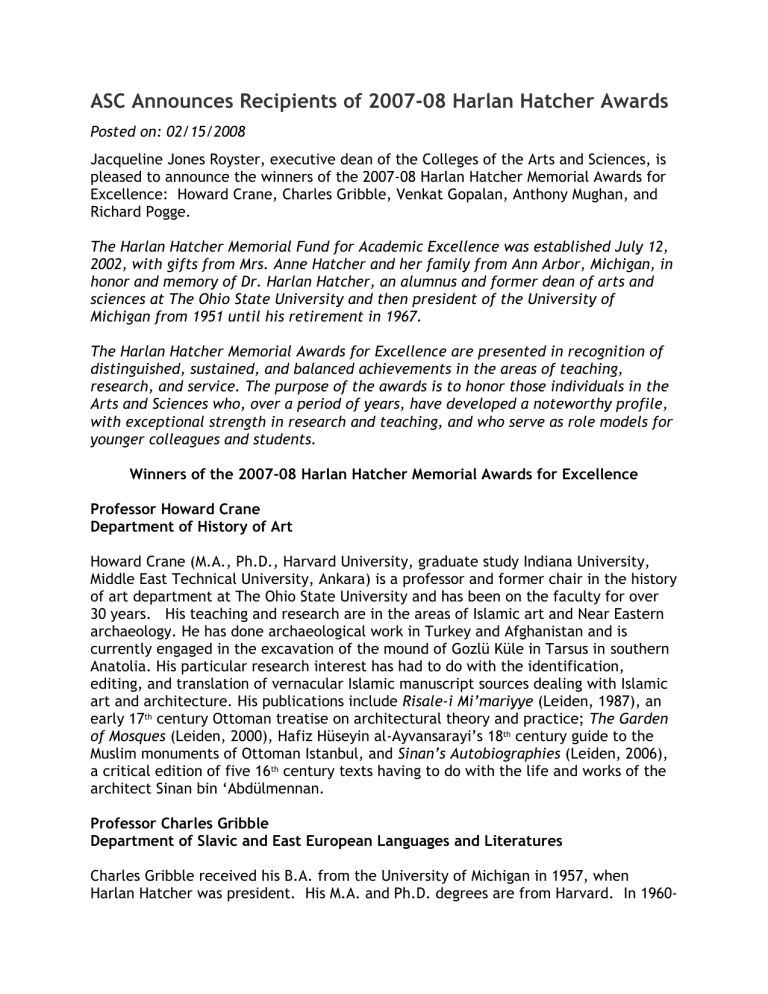
ASC Announces Recipients of 2007-08 Harlan Hatcher Awards
Posted on: 02/15/2008
Jacqueline Jones Royster, executive dean of the Colleges of the Arts and Sciences, is pleased to announce the winners of the 2007-08 Harlan Hatcher Memorial Awards for
Excellence: Howard Crane, Charles Gribble, Venkat Gopalan, Anthony Mughan, and
Richard Pogge.
The Harlan Hatcher Memorial Fund for Academic Excellence was established July 12,
2002, with gifts from Mrs. Anne Hatcher and her family from Ann Arbor, Michigan, in honor and memory of Dr. Harlan Hatcher, an alumnus and former dean of arts and sciences at The Ohio State University and then president of the University of
Michigan from 1951 until his retirement in 1967.
The Harlan Hatcher Memorial Awards for Excellence are presented in recognition of distinguished, sustained, and balanced achievements in the areas of teaching, research, and service. The purpose of the awards is to honor those individuals in the
Arts and Sciences who, over a period of years, have developed a noteworthy profile, with exceptional strength in research and teaching, and who serve as role models for
younger colleagues and students.
Winners of the 2007-08 Harlan Hatcher Memorial Awards for Excellence
Professor Howard Crane
Department of History of Art
Howard Crane (M.A., Ph.D., Harvard University, graduate study Indiana University,
Middle East Technical University, Ankara) is a professor and former chair in the history of art department at The Ohio State University and has been on the faculty for over
30 years. His teaching and research are in the areas of Islamic art and Near Eastern archaeology. He has done archaeological work in Turkey and Afghanistan and is currently engaged in the excavation of the mound of Gozlü Küle in Tarsus in southern
Anatolia. His particular research interest has had to do with the identification, editing, and translation of vernacular Islamic manuscript sources dealing with Islamic art and architecture. His publications include Risale-i Mi’mariyye (Leiden, 1987), an early 17 th century Ottoman treatise on architectural theory and practice; The Garden
of Mosques (Leiden, 2000), Hafiz Hüseyin al-Ayvansarayi’s 18 th century guide to the
Muslim monuments of Ottoman Istanbul, and Sinan’s Autobiographies (Leiden, 2006), a critical edition of five 16 th century texts having to do with the life and works of the architect Sinan bin ‘Abdülmennan.
Professor Charles Gribble
Department of Slavic and East European Languages and Literatures
Charles Gribble received his B.A. from the University of Michigan in 1957, when
Harlan Hatcher was president. His M.A. and Ph.D. degrees are from Harvard. In 1960-
61 he studied for a year at Moscow University as a participant in the official Russian-
American academic exchange. He taught at Brandeis University from 1961 until 1968, and at Indiana University from 1968 until 1975. He joined the Department of Slavic
Languages at OSU in 1975, and was promoted to professor in 1989. His teaching and research specialties include the structure and history of the Russian language, Old
Church Slavonic, and the South Slavic languages.
He is author, editor, or co-editor of ten books and co-author of fourteen volumes of language-teaching materials for Bulgarian. He was president and editor of Slavica
Publishers, Inc., from 1966 to 1997, during which time Slavica published 250 books and over 60 journal issues in the fields of Slavic and East European linguistics, languages, literature, bibliography, history, and folklore. Slavica was (and is) the largest publisher in the Western Hemisphere of scholarly books and textbooks in the fields of Slavic languages and linguistics.
In 1992, Dr. Gribble received the American Association of Teachers of Slavic and East
European Languages Award for Distinguished Contribution to the Profession. He served as president of the Bulgarian Studies Association from 2001 to 2003. In 2006, he was awarded the Badge of Honor “Marin Drinov” by the Bulgarian Academy of Sciences
(the highest honor awarded by the academy) for scholarly, pedagogical, and organizational contributions to Bulgarian studies.
Professor Venkat Gopalan
Department of Biochemistry
Venkat Gopalan obtained a B.Sc. (Chemistry) from University of Madras, India, before coming to the U.S. in 1986 for pursuing graduate studies. Under the guidance of
Professor Robert H. Glew, he received a Ph.D. in biochemistry from the University of
New Mexico in 1991 for his work on biochemical characterization of two mammalian beta-glucosidases, one of which is involved in Gaucher disease. He then began his postdoctoral work in the group of Professor Sidney Altman at Yale University, where he was supported by postdoctoral fellowships from the Catherine and Weldon
Donaghue Foundation and the Anna Fuller Cancer Research Fund to study RNA-protein interactions in bacterial ribonuclease P (RNase P), a ribonucleoprotein enzyme that is unique among cellular catalysts for employing an RNA as the catalytic moiety. During this period, he was also a visiting scholar in the group of Professor Aaron Klug, MRC
Laboratory of Molecular Biology, Cambridge, England. Since coming to Ohio State’s
Department of Biochemistry in 1998 as an assistant professor, Dr. Gopalan has assembled a team to characterize archaeal/eukaryal RNase P enzymes that have more protein subunits than their bacterial counterparts. Understanding these more complex enzymes is expected to address the overarching question of why the extant cell, which relies almost solely on proteins for catalytic and structural roles, uses RNAmediated catalysis in vital macromolecular machines such as RNase P and has even retained these evolutionary vestiges from a hypothetical RNA world. His laboratory is also exploring the potential of RNase P as a tool to control gene expression in plants.
He was promoted to associate professor in 2003 and is a member of different life
sciences graduate programs at OSU.
Dr. Gopalan has taught various undergraduate and graduate courses at OSU, including a course on intermediary metabolism that is taken by biochemistry majors and firstyear graduate students from different biochemistry-related disciplines.
Dr. Gopalan was the founding advisor to the Biochemistry Undergraduate Club and was responsible for developing an M.S. (biotechnology) program. He co-directs with
Professor Amanda Simcox an NSF REU Site program in biochemistry and molecular genetics that provides summer research opportunities to students from underrepresented groups.
Professor Anthony Mughan
Department of Political Science
Anthony Mughan has been at The Ohio State University since 1988 where he is currently professor of political science and director of the Undergraduate
International Studies Program. He held teaching and research positions previously at the University of Cardiff in Wales, U.K., and at the Australian National University in
Canberra, Australia. At Ohio State, his international studies responsibilities include creating challenging and stimulating internationally-oriented degree programs for the university’s undergraduate student population. His research interests are broadly focused. Past research has included a book-length analysis of the determinants and impact of U.S. economic aid and military assistance transfers to Third World countries. His current research looks at the implications of economic globalization for the political attitudes and behaviors of the mass publics of the world’s established democracies. Specific themes covered include job insecurity, anti-immigrant prejudice, and electoral support for anti-immigrant political parties.
Professor Richard Pogge
Department of Astronomy
Richard Pogge was born in Nebraska and grew up in California’s northern Mojave
Desert. He received a B.S. in physics from Caltech in 1983 and a Ph.D. in astronomy and astrophysics from UC Santa Cruz in 1988 where he worked with Professor Donald
Osterbrock. After a year as the W.J. McDonald Postdoctoral Fellow at the University of Texas at Austin, he came to The Ohio State University in 1989 as a postdoctoral researcher in the astronomy department. He joined the faculty as an assistant professor in 1992 and became a full professor in 2003.
Dr. Pogge’s research has covered a wide range of topics in observational astronomy, using ground-based telescopes and the Hubble Space Telescope. His recent work with students and colleagues seeks to accurately measure the masses of supermassive black holes in nearby active galaxies in order to calibrate the key scaling relations that allow us to extend these methods out to cosmological distances. Closer to home, he is part of OSU's MicroFUN collaboration, an international network of amateur and
professional astronomers searching for extrasolar planetary systems using gravitational microlensing. Since coming to Ohio State he has been actively involved in the development of advanced astronomical instruments with OSU's Imaging Sciences
Laboratory, first as a postdoc and most recently as vice chair for instrumentation.
Their latest project is a pair of optical multi-object spectrographs for the Large
Binocular Telescope in Arizona.
He has taught astronomy at all levels at Ohio State, and has introduced a number of new teaching technologies into the department’s 100-level courses. Recently he became one of the first professors at OSU to make podcasts of his lectures available on the Internet. The podcasts of his Astronomy 161 and 162 classes have reached far beyond OSU and been featured on iTunes where they are among the top highereducation podcasts. He has received hundreds of e-mails from listeners of all ages and backgrounds worldwide. He is also in demand as a speaker to schools and has given regular public talks on current and historical topics in astronomy at the Perkins
Observatory and in the COSI Electronic Experts series.
